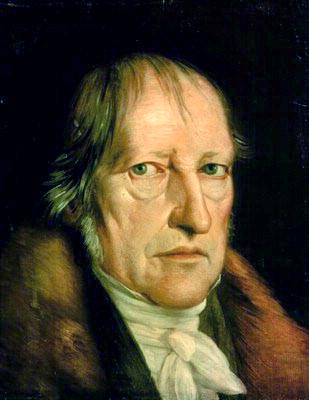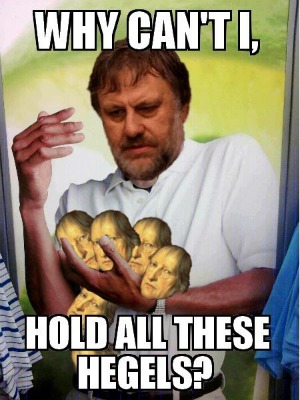IF YOU ASK ANY random group of philosophy fans who their least favorite philosopher is, you won’t have to survey more than two philosophiles before you hear the name of the 19th century German Idealist philosopher Georg Wilhelm Friedrich Hegel.

THIS IS GEORG WILHELM FRIEDRICH HEGEL (1770-1831), PERHAPS THE MOST HATED MAN IN PHILOSOPHY
Hegel (if you’ve bothered to read his work at all ‘cause these days a lot of people don‘t) is most famously associated (although some say mistakenly) with the concept of the dialectic. The dialectic goes as follows: one starts with an idea, the thesis, “against which is opposed by” a conflict (the antithesis). The result of the confrontation is called synthesis, which is meant to resolve the conflict.

DID YOU KNOW THAT THE DIALECTIC, DESCRIBED AS THESIS/ANTITHESIS/SYNTHESIS NEVER ACTUALLY APPEARS (AS SUCH) IN HEGEL’S WRITINGS? DO YOU CARE?
As one of philosophy’s notoriously (mostly German) incomprehensible philosophers,a list that also includes Nietzsche, Kant, Lacan, and Husserl, Hegel’s philosophy was popular in the late 19th century. During that time, the majority academic philosophers in Great Britain and in the U.S. were Hegelians. Hegel’s writings on modernity, politics, and civil society not only influenced the German Idealists, but also Protestant theologians who attempted to reconcile philosophy and Christianity.

Hegel’s philosophical masterpiece Phenomenology of the Spirit, written in 1807, was intended to get us to absolute knowledge. Hegel believed that his philosophy was the culmination of previous philosophical thought and attempted to solve all the problems of philosophy through a focus on logic and history.
Hegel says
What I have set out to do is to help bring philosophy closer to the form of science, to the goal where it can lay aside the title ‘love of knowing’ and be actual knowing
Now, there are people who like philosophy.
Most people who like philosophy have a favorite philosopher.
Hegel is no one’s favorite philosopher.

SAID NO ONE, EVER
Personally, Hegel is not one of my favorites.
No German philosopher is.

Listen: It’s no secret that there’s a lot of Hegel hate out there. Not that it’s completely undeserved.
Someone of it, I think, has to do with the way he looks.
I mean, look at the guy

THIS IS THE KIND OF FACE YOU CAN GROW TO HATE BY JUST LOOKING AT IT
Ok, that’s kind of ad hominemy. We shouldn’t dislike a philosopher solely based on their looks.
If we did absolutely no one would read Leibniz. Or Heidegger.

OH, THANK GOD
If you think about it, it’s kind of an accomplishment to be so despised by so many people.
Ayn Rand called Hegel’s philosophy “witchdoctory”.
This is a critique of Hegel coming from a woman about whom Dorothy Parker once said of Rand’s Atlas Shrugged
It is not a novel that should be thrown aside lightly. It should be thrown with great force.
Even Schopenhauer called Hegel’s work “stupid and inept”.

SURE YOU DO, OSCAR WILDE. SURE YOU DO.
Lots of philosophers dislike Hegel, but why do so many other people hate Hegel so much?

What did Hegel do that was so philosophically horrible?
Maybe people hate Hegel because, as some claim, Hegel the man is as boring as his philosophy.

Maybe our collective hatred of Hegel has something to do with the fact that Hegel treated his landlady like crap. Or maybe because Hegel fathered an illegitimate son (Ludwig) with his landlady, and that Ludwig not only spent his first ten years in an orphanage, but that Hegel also refused to pay for the boy’s education.
Yeah, Hegel was a shitty person but that’s probably not the reason why people hate him so much.

Maybe it’s because Hegel dared to argue that Kant’s notion of ding an sich, is contradictory and inconsistent.

It’s generally held that it is not wise to knock Immanuel Kant, but it’s a good guess that the reason why no one likes Hegel has everything to do with his philosophy. Second to fellow German philosopher Martin Heidegger, Hegel rates high on the “Huh???” chart.
Hegel is notoriously difficult to understand.

Thus maintaining the German tradition of convoluted writing.
Simply put: the reason why so many people hate Hegel is because most people do not understand Hegel.
Even philosophers.
Hegel claimed on his death bed that only one man could understand him and that that man had misunderstood him.

And those who do understand Hegel think his work is, well, stupid.
Especially philosophers.
I’m not going to even PRETEND to understand the first thing about anything Hegel wrote.
This fact, however, doesn’t necessarily prohibit us from hating him.
Especially if you’re a philosopher.

Here’s a short list of what other philosophers say about Hegel:
Bertrand Russell on Hegel in Philosophy and Politics:
Hegel’s philosophy is so odd that one would not have expected him to be able to get some men to accept it, but he did. He set out with so much obscurity that people thought it must be profound. It can quite easily be expounded lucidly in words of one syllable, but then its absurdity becomes obvious.
Russell says that Hegel is the most difficult to understand of the great philosophers because almost all of his doctrines are false.
Schopenhauer wrote on “the stupefying influence of Hegel’s sham wisdom” and suggested that no one under forty read Hegel. Schopenhauer not only suggested reading Hegel will ruin one’s brain, he also declared Hegel a pseudo-philosopher whose philosophy paralyzes all mental powers and stifles one’s ability to think.

Philosopher Glenn Alexander Magee says:
Hegel is not a philosopher. He is no lover or seeker of wisdom -he believes he has found it. […] By the end of Phenomenology [of Spirit], Hegel claims to have arrived at Absolute Knowledge, which he identifies with wisdom. Hegel’s claim to have attained wisdom is completely contrary to the original Greek conception of philosophy as the love of wisdom, that is, the ongoing pursuit rather than the final possession of wisdom.
Roger Scruton calls Hegel’s work
Like a beautiful oasis around a treacherous pool of nonsense, and nowhere beneath the foliage is the ground really firm.
Popper calls Hegel “meaningless verbiage”.

You spend years trying to understand Hegel, but no one can agree on exactly what’s the meaning of Hegel’s philosophy.
Even Hegel himself proclaimed that no one ever understood him.
And if no one understands you, that means there’s a lot of room for misinterpretation.
This, as everyone knows, is a problem.
Some folks think that the problem with Hegel is that a lot of people misunderstand Hegel’s dialectic. And everyone not agreeing on the meaning of Hegel’s philosophy has resulted in a bunch of Hegel-influenced philosophical ideologies ranging from Continental philosophy to the philosophy of Karl Marx, and the rise of Nazism in Germany.

YOU CAN BLAME ALL OF THIS ON HEGEL
The real problem with Hegel, according to a bunch of philosophers (and some other people), is that Hegel builds theories so great (great meaning big, not fantastic) that his philosophy collapses under its own weight. Hegel attempt to explain all reality – tries to solve all problems of philosophy – a task Hegel ultimately fails to accomplish. Hegel’s philosophy is so convoluted, complicated, and disconnected from reality, that it lacks any practical usefulness. Hegel is just so many words.
But in the end, he hasn’t really said a thing.
Ok, if no one likes Hegel or his philosophy – especially his philosophy, how is Hegel still so popular? Why or how does anyone still know who he is? Why are philosophy students still assigned Hegel’s work as a part of their required reading?
Seriously, why haven’t we decided to just stop reading Hegel?

The real real problem with Hegel is that getting rid of the man and his philosophy isn’t as easy as declaring Hegel’s work meaningless verbiage and tossing it out to the rubbish bin of bad philosophical ideas. The reason why we can’t destroy Hegel is this: so much of our culture is Hegelian. Hegel’s philosophy, even though he’s possibly the most hated man in philosophy, is an inextricable part of our culture.

Francis Fukuyama, author of The End of History and The Last Man, wrote of Hegel’s lasting influence on philosophy:
For better or worse, much of Hegel’s historicism has become part of our contemporary baggage. The notion that mankind has progresses through a series of primitive stages of consciousness on his path to the present, and that these stages correspond to concrete forms of social organization, such as tribal, slave owning, theocratic, and finally democratic egalitarian societies, has become inseparable form the modern understanding of man. Hegel was the first philosopher to speak the language of modern science, insofar as man for him was the product of his concrete historical and social environment and not, as earlier natural right theorists would have it, a collection of more or less fixed “natural” attributes. The mastery and transformation of man’s natural environment through the application of science and technology was originally not a Marxist concept, but a Hegelian one. Unlike later historicists whose historical relativism degenerated into relativism tout court, however, Hegel believed that history culminated in an absolute moment – a moment in which a final, rational form of society and state became victorious.
In the end, what are we to think about Hegel? I don’t know. Think whatever you want. Read, don’t read. I’m pretty sure there’s little chance that Hegel will take offense at what you think of him or his works.
Or what anyone thinks of what he wrote.
I’ll admit I haven’t met a book by Hegel that i finished, so really, am I in any position to say anything about the most Hated Man in Philosophy? Maybe. Is anybody?

Whatever we decide about Hegel, I’m sure that Schopenhauer is looking up at us and enjoying all of this… or not.
SOURCES:
http://www.newcriterion.com/articles.cfm/hegel-kimball-234
http://www.evphil.com/blog/hegel-poster-child-for-what-is-wrong-with-philosophy
https://en.wikiquote.org/wiki/Georg_Wilhelm_Friedrich_Hegel#Quotes_about_Hegel
I love this blog. It makes me laugh. Nothing too intelligent to say
Thanks!
…I think.
Its not funny but just stupid – and the author is not saying one true thing about hegel (i stopped reading when it came to dialectics; nowhere in his work Hegel is defending an idea of “thesis-antithesis-synthesis” – thats part of the 20. century reception of people who havent read him)
Dear Prof Hegel…please say some true things about Hegel to help us all understand. For example, tell us what you think Hegel would think about how “his” dialectic is put into practice today. And perhaps you could help us understand who exactly it was and how that person took his work and turned it into what appears to be a system of mind control for the West of today. Thanks so much for your contribution to our understanding.
As you may have noticed, this post has very little actual Hegelian philosophy in it.
That was completely intentional.
I admit I am no Hegel scholar. As a fan of philosophy, I thought it my duty to understand Hegel’s philosophy. While getting acquainted with Hegel, I noticed that there is fair amount of Hegel hate. People genuinely do not like Hegel. I wanted to understand why. That’s the question I am asking on this post — not to understand Hegel’s philosophy, but to figure out why he is hated so
— especially given his influence on the culture.
As for understanding Hegel’s actual philosophy, I am still trying to figure it out. Perhaps when I am comfortable enough with taking on how Hegel’s dialectic is interpreted (or misinterpreted as the case may be), I’ll write something about that.
CHEERS.
TMP
Deductive formal logic as refined by Descartes, Bacon, and Newton into the scientific method has advanced mankind toward truth across nearly every discipline over the last two hundred years. We have progressed orders of magnitude more in that short time than we had in the preceding two thousand centuries.
Deductive reasoning is akin to tossing the bathwater and keeping the baby.
Dialectics would have us force-feed the bathwater to the baby to get a better baby.
The most damaging impact of dialectical “reasoning” is that it is entirely incompatible with deductive reasoning. Anyone who chooses dialectics over formal logical deduction is doomed to wander in a desert of lies.
Unfair. The dialectic isn’t a form of reasoning. The dialectic is an observation about the nature of evolution itself, be it at an individual, cultural, or ideational level. Anyone with an ounce of deductive reasoning capabilities can see, after the fact, how a thing comes to be as a result of opposing forcing (in the case of material objects), or how a person’s self-concept develops (by recognizing themselves by virtue of all the rest of the world that they do not see themselves in), or even how institutions take form as a result of compromises between competing interests. The dialectical is a useful tool, in conjunction with deductive reasoning, to understanding a thing. The danger of it, to which you allude, is believing that you can know in advance the ultimate outcome of a person, place, or thing, by merely proposing a dialectical relationship that MUST resolve itself in such a way… like marx’s historical materialism. No thinking person assumes that they have all the variables. Or at least, nobody who understands science or epistemology purports to know in advance all the elements that will play into a dialectical movement. But after the fact, we can look at all the social and economic factors that did, in fact, play into (for example) America’s civil war, and see how the opposing forces both determined the course of the nation into that war, and how the people and institutions at the time then attempted to resolve the conflict through the Reconstruction Era.
Just because Hegel himself abandoned deductive logic and arrogated to himself the position of the absolute knower does NOT make that leap a necessary part of the dialectical movement. Nor does his misuse of the tool he is largely credited with inventing make that tool useless for others.
As for the ultimate faith in formal deductive logic you seem so readily willing to embrace, remember Gödel’s incompleteness theorem. No system can prove itself, and every formal system will produce “true” statements that contradict. We are ignorant beings, but excellent tool makers. And we need all the tools we can get.
Unfair?
You go ahead and live in your frame of reference, and I will live in mine.
We have no common ground between us to discuss anything of consequence.
Please have a nice day.
My bad. I thought a forum like this would be a good place for open-minded philosophical discourse.
F**k me, right? Enjoy your myopic frame of reference.
Please keep making the world a crappier place for everyone else with your snap judgments.
Thank you for confirming that we have no common ground between us.
You’re welcome. I always enjoy watching people feed themselves on their preconceived notions. I bet all your friends agree with you on every conceivable point as well. Otherwise, one disagreement on a point and you’d clearly have no common ground on which to have any relationships. God. Must be lonely. You enjoy that.